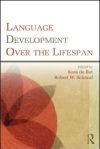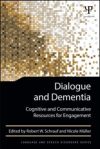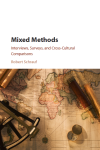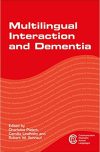Robert W. Schrauf

Education
Professional Bio
Robert Schrauf’s research addresses language and culture in health, illness, and aging – hence: health applied linguistics and medical anthropology. He has collaborated with colleagues across linguistic and clinical disciplines in projects, special issues, and edited volumes on language and Alzheimer’s disease, as for example Dialogue and Dementia (with Nicole Müller; Taylor & Francis, 2014) and Multilingual Interaction and Dementia (with Charlotte Plejert and Camilla Lindholm; Multilingual Matters, 2017) and on health applied linguistics more generally: Applying Linguistics in Health Research, Education, and Policy (with Brett Diaz; Mouton de Gruyter, 2023). He works with qualitative methods (discourse analysis, linguistic anthropology) and quantitative methods (multivariate exploratory techniques, metric scaling), and in 2016 he published entitled Mixed Methods: Interviews, Surveys, and Cross-Cultural Comparisons (Cambridge). Current projects are a study on helpseeking by older Puerto Ricans after Hurricane Maria (NIH) and a collaboration with Children’s Hospital of Philadelphia to develop and deliver a curriculum for academic physicians who work with multilingual populations (NIH). He teaches methods seminars (APLNG 597’s) in Mixed Methods and in Linguistic Ethnography, topical courses in Language Analysis (APLNG 577) and Applied Linguistics and Health Sciences (APLNG 511), and a pedagogical course in Language Assessment (APLNG 583).
Select Recent Articles and Book Chapters
Schrauf, Robert W. and López de Victoria, Patria. (2024). Disaster solidarity and survivor ethics: A case study of Hurricane María in Puerto Rico. Disasters 48, 1, e12593. (Note: 2024 is the first year of online only publication of this journal).
Schrauf, R.W. (2023). “Health applied linguistics – The what and the who." In Diaz, B. and Schrauf, R.W. eds., Applying linguistics in health research, education, and policy. Pp. 1-18. Berlin/Boston: De Gruyter Mouton.
Schrauf, R.W. (2023) “Research translation as situated practice." In Diaz, B. and Schrauf, R.W. eds., Applying linguistics in health research, education, and policy. Pp. 1198-139. Berlin/Boston: De Gruyter Mouton.
Kinginger, C. and Schrauf, R.W. (2023). "Mixed methods research on language abroad." In Pérez-Vidal, C. and Sanz, Cristina, eds. Methods in Study Abroad Research. Past, Present, and Future. John Benjamins. Pp. 85-106.
Schrauf, R. W. (2020). Epistemic responsibility – Labored, loosened, and lost: Staging Alzheimer’s disease. Journal of Pragmatics, 168, 56-68.
Schrauf, R. W., López de Victoria, P., & Diaz, B. (2019). Linguistic stance: An integrative paradigm for mixed methods social science. Language in Society, 49, 257-281.
Schrauf, R. W. (2018) Mixed methods designs for making cross-cultural comparisons. Journal of Mixed Methods Research, 12, 477-494
Schrauf, R. W., & Amory, M. (2017). Training in clinical assessment: Proxying, translating, and voice-over as discursive devices. In C. Plejart, C. Lindholm, & R. E. Schrauf (Eds.), Multilingual interaction and dementia, (pp. 175-205). Bristol: Multilingual Matters.
Iris, M., & Schrauf, R. W. (2016). Aging, memory loss, and Alzheimer's disease: What do refugees from the former Soviet Union think?, Journal of Religion, Spirituality, and Aging, 29, 130-146.
Schrauf, R. W., & Iris, M. (2014). How to construct a case of Alzheimer’s disease in three languages: Case-based reasoning in narrative gerontology. Ageing and Society 34, 2, 280-309.
Schrauf, R. W., & Iris, M. (2014). 'What they're said to say': The discursive construction of Alzheimer's disease. In R. W. Schrauf, & N. Müller (Eds.), Dialogue and dementia: Cognitive and communicative resources for engagement (pp. 27-57). New York: Routledge.
Schrauf, R. W. (2013). "Reading compromised and preserved cognition into and out of conversational data." In B. Davis, & J. Guendouzi (Eds), Pragmatics in Dementia Discourse: Applications and Issues, pp. 245-278. Cambridge Scholars Press.
Schrauf, R. W. (2013) Using correspondence analysis to model immigrant multilingualism over time. In J. Duarte, & I. Gogolin, I. (Eds). Linguistic super-diversity in urban areas – Research approaches (pp. 27-43). Amsterdam: John Benjamins.
Schrauf, R. W. (2011). The shifting structure of emotion semantics across immigrant generations: Effects of the second culture on the first. In M. Schmid, & W. Lowie (Eds). Modeling bilingualism: From structure to chaos (pp. 177-198). Amsterdam: John Benjamins.
Schrauf, R. W., & Iris, M. (2012). Very long pathways to diagnosis among African Americans and Hispanics with memory loss and behavioral problems associated with dementia. Dementia, 11, 743-763.
Schrauf, R. W., & Iris, M. (2011). Using consensus analysis to investigate cultural models. In D. Kronenfeld, D., G. Bennardo, G., V.C. DeMunck, & M. Fischer (Eds). Blackwell companion to cognitive anthroprology (pp. 548-568). Boston: Blackwell.
Schrauf, R. W., & Iris, M. (2011). A direct comparison of popular models of normal memory loss and Alzheimer’s disease in samples of African Americans, Mexican Americans, and refugees/immigrants from the Former Soviet Union. Journal of the American Geriatrics Society, 59, 628-636.
Schrauf, R. W., Sanchez, J. (2010). Age-effects and sample size in freelisting. Field Methods, 22, 70-87.
Schrauf, R. W. (2009). English use among older bilingual immigrants in linguistically concentrated neighborhoods: Social proficiency and internal speech as intracultural variation. Journal of Cross-Cultural Gerontology, 24, 157-179
Steis, M., & Schrauf, R. W. (2009). A review of translations and adaptations of the MMSE in languages other than English and Spanish. Research in Gerontological Nursing, 2(2), 214-224.




